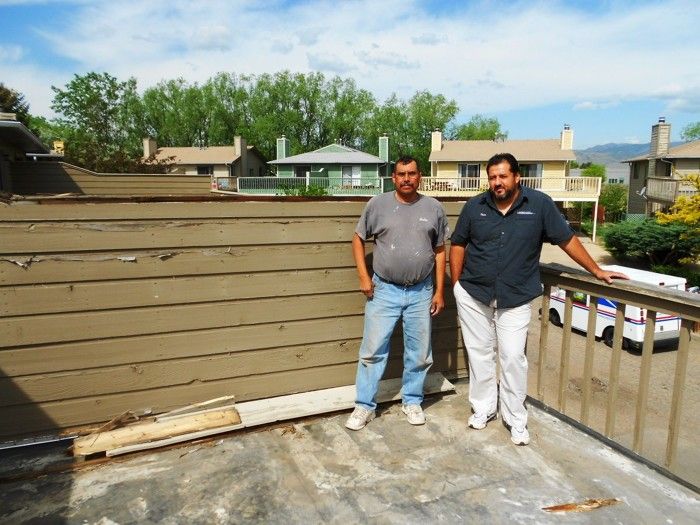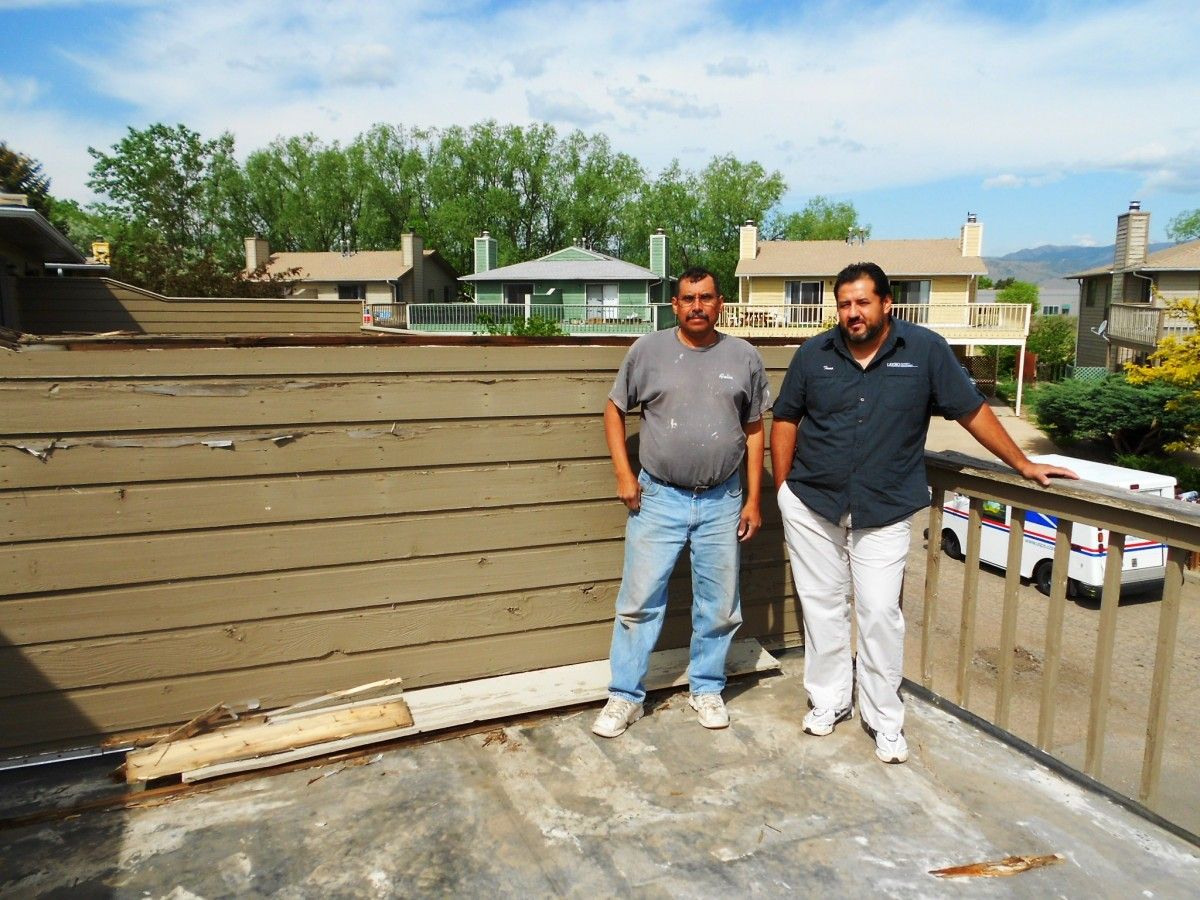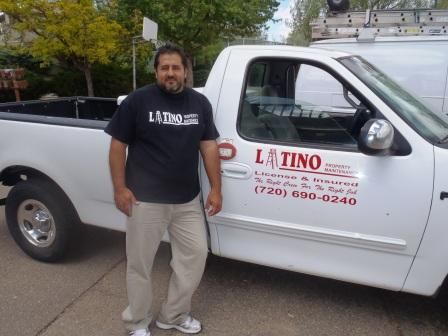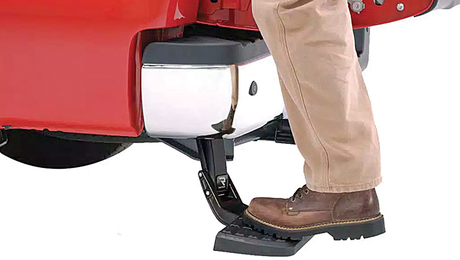
What caught my eye about Temo Delao’s white Ford pickup truck parked at the post office where I receive my mail was the clever graphic on his company lettering, a painter’s ladder in place of the “A” for the trade name “LATINO.” It made me smile, and I liked how the company name and logo brought to mind the great number of Latinos in the construction industry. I read the qualifiers that followed LATINO in smaller type, “Property Maintenance; Licensed and insured.”
The truck’s owner sat in the cab fiddling with his cell phone, so I approached the opened window on the passenger’s side and complimented the graphics. He smiled and told me a lot of people stop and compliment his signs, and then added proudly, “I personally designed the name and logo.” Curious, I asked for and he agreed to an impromptu interview.
Temo came from Acapulco, Guerrero, Mexico. He moved north to find work about 20 years ago. Like most immigrants, his first jobs were “a little bit of everything, and pretty menial, washing dishes, flipping burgers, and whatever I could get,” Temo said. Eventually, this led to a helper’s position on a framing crew in Boulder, Colo. The work was hard, humping lumber and picking up scraps, but in the process, Temo learned to read a tape measure, swing a hammer, and cut straight with a Skilsaw. He made wages in the hot sun, rolling joists and standing walls as the home-building economy boomed through the mid-’90s.
An inquisitive fellow, Temo struck up conversations with the tradespeople who came and went on the job site, and was especially intrigued by the mechanical contractors who installed pipes and ductwork on housing tracts. He was surprised to learn they earned nearly double what he could make as a competent framer. “And they work indoors, too,” Temo recalls, since Acapulco had ill prepared him for winter framing on Colorado’s Front Range. So he moved again, this time quitting his job on the framing crew to start over at the lowest levels of the mechanical trade. He had an advantage, though: As a framer, Temo knew exactly what lay behind the walls, and he soon began to make his mark in the company’s lucrative remodeling business, finding clever routes to retrofit ductwork through existing walls and ceilings. Six years later, Temo had a journeyman’s license and a crew under his direction. His ambition was even greater, though, nothing short of the American dream: to be his own boss.
He applied for and obtained a Mechanical Class B, commercial and residential contractor’s license, and gave his boss two weeks’ notice. Then the dream quickly turned into a nightmare. “I printed up a handful of business cards and started handing them out with great expectations,” Temo says, “but nobody called. I had no work for six months. Every day I got dressed and went out as if going to work. I handed out cards and talked to neighbors. I did everything I could think of to get work, any work, even if I didn’t ‘t know how to do it. I read books on how to paint and cut lawns, and I got some little jobs cleaning up yards, trimming bushes, and I painted a fence, whatever.”
Six months passed practically work-free, and then it turned into another year of odd jobs and little money. “What saved me was an understanding spouse with a full-time job,” says Temo. Looking back, he now understands the problem came with trying to solicit homeowners. Established heating-air contractors could offer financing and represent brand-name equipment. Temo could not compete, and disillusioned, he even thought about going back to work for his old boss, until he got his break. A friend introduced him to a woman who sold mobile homes.
“She bought these trailer homes and had them placed on the lots in a motor-home park,” Temo says. “Then they had to be hooked up to utilities, and the water heater, furnace, and gas hookup had to be checked for leaks.” With his mechanical contractor’s license, Temo could do this work. While on the job, he saw that the mobile homes also needed skirting, drywall repairs, and other work, so he was soon contracting the whole installation. Temo realized that this one client brought steady work, and he began looking for others who could offer repeat business.
Temo approached property-management companies, and the vision of LATINO Property Maintenance suddenly emerged. He could fix furnaces and plumbing, as well as paint, patch drywall, and do whatever the property manager needed. This was how Temo turned jack of all trades into the master of one: full-service multifamily maintenance. Temo said the recession didn’t affect him at all. “I was able to put a lot of the guys to work that had once helped me, and they were hurting, out of a job, and it felt good to help my friends,” he says.
Nowadays, Temo’s wife no longer works, and he can afford a new truck, a house, and best of all, weekends with the family. The small jobs Temo did for property managers turned into big jobs as his clients came to trust and rely on the LATINO brand. “It may be a little job, like replacing some decking or changing a water heater, but since there are so many units, it turns out to be 40 decks, or 300 water heaters,” explains Temo, describing what he likes about the property-maintenance business. “I never have to hustle for work.”
When I visited Temo on one of his job sites, we talked further, and he revealed a few management secrets that made it clear why Temo found success. He enjoys the respect of his crew, referring to himself as the company “quarterback,” not the boss. “My main job is to keep the work coming so we never stop working,” he says. With three full-time employees and a cadre of available subs to help as needed, Temo likes to include everyone in the decision-making process, asking for at least three solutions to every problem. “Then we evaluate each one, and decide on the most efficient option,” he explains.
Also, on the back of his trucks-and he has three-you find the words, “100% satisfaction guaranteed.” For Temo, honesty is a solid object, a commodity like lumber and concrete. “If someone is not completely satisfied with my work, I try to address the problem. If I realize they will still not be satisfied, I fix the problem and then refund all of their money. I will not charge for any job that leaves a customer unhappy,” he says. With this business model, Temo has gained his clients’ trust and respect.
Fine Homebuilding Recommended Products
Fine Homebuilding receives a commission for items purchased through links on this site, including Amazon Associates and other affiliate advertising programs.

Affordable IR Camera

8067 All-Weather Flashing Tape

Handy Heat Gun
























View Comments
This is really a good idea to be self taught. Its true that when we start learning, We should develop the things on our own, The benefit in this is that we remember that thing for the long time.As in this blog the nice example is given that name and the logo was personally designed by him.